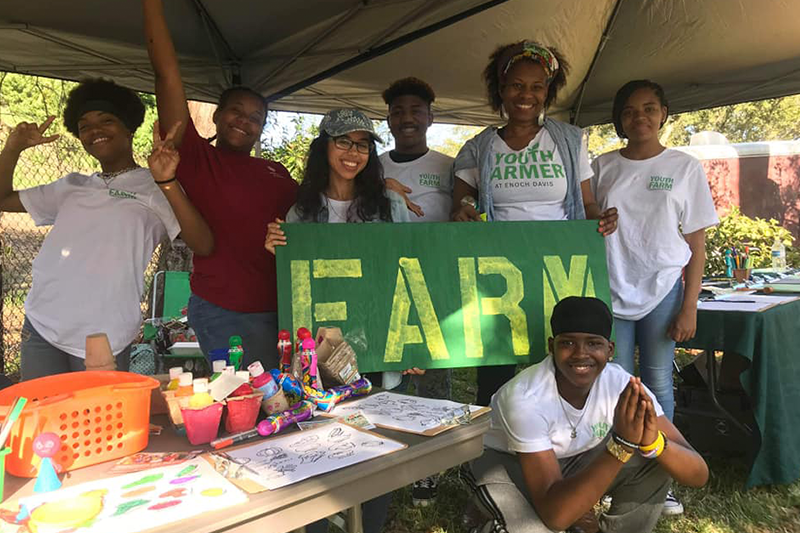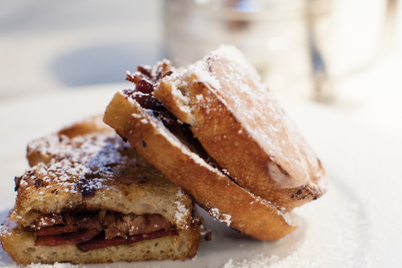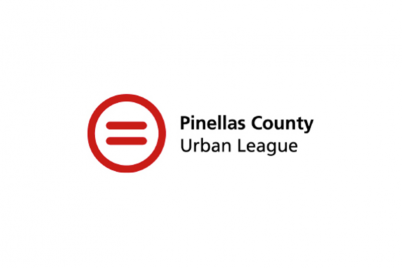Youth Farm participants at the Collard Green Festival last February.
ST. PETERSBURG – Have you been wondering what’s going on with the City of St. Petersburg’s Youth Farm program that started last year? Well, wonder no more.
The Youth Farm aimed to empower youth to lead urban agriculture projects under community guidance and resources. It has proven to be a successful strategy in youth, workforce and neighborhood development. Participants from seventh grade through college start as workers, then become mentors, managers and eventually food systems leaders.
But don’t take our word for it! We caught up with some of the participants to get the scoop on their projects and hear what’s on their minds.
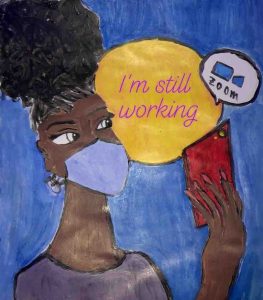 Adapting to the new: Youth Farm and COVID-19
Adapting to the new: Youth Farm and COVID-19
Written by Shavion Hobbs, Art by Kalia Early
My name is Shavion Hobbs, and I am a Youth Ambassador at the St Pete Youth Farm. I’ve been working with the group since Sept. of 2019. Life was going great, we were able to meet in person, interact with the others and do hands-on learning, but things took a turn when the pandemic approached in March.
The pandemic is known as Coronavirus (COVID-19) or a higher grade of the flu. Due to COVID-19 being spread so easily, we were required to stay home unless it was urgent to leave. Many businesses were shut down, and our worksite at the Enoch Davis Center was also closed.
The building closure forced us to shift how we operate, and the one and only best collaboration manager of St. Pete Youth Farm, Carla Bristol, was able to come up with a game-changing plan. Our work was moved to the virtual platform known as Zoom. This has not only kept us safe, but it also allows us to work still and get paid.
Our new space felt uplifting because we could see each other with real-time interactions. This new virtual workspace required adjustment, but we were able to honor the guidelines put in place by the Center for Disease Control. The guidelines were to social distance, basically stay six feet apart from each other, always wear a mask and stay sanitized by always washing your hands and don’t touch your face.
It was hard at first, but it has really gotten better as time has passed.
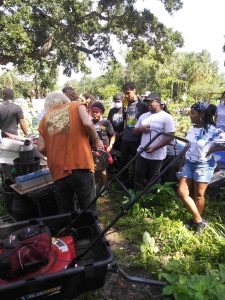 Passing the Energy
Passing the Energy
By Demetric Landers
After three months of working virtually, we visited the Bartlett Park Community Garden with guest speaker Mr. Christopher Clement. He shared his knowledge about solar panels, solar energy and the purpose it has in this local community garden.
The Bartlett Park Garden is completely powered by the sun. The energy from the sun is collected and used with water to plant and grow delicious produce for the community. After this visit, I decided to go back home and do some research of my own. I learned that solar panels have a lot of benefits.
They are safer for the environment and save a lot of money. Over the past 20 years, those who have purchased solar panels saved up to $3,000 annually. The sun is a powerful source of energy and savings. We live in the Sunshine City in the Sunshine State, and we’re only harnessing a fraction of the energy from the sun.
By installing solar panels, we could make a big difference to the planet. Now I see why the solar panels are SO important to the garden as well as the world! I will always remember the number one rule in the Bartlett Park Community Garden is to always turn off the power when you’re the last one to leave. This is the golden rule because if you don’t, all that energy could be wasted and those batteries are not cheap.
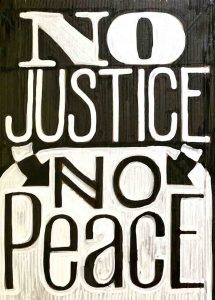 Enough is enough!
Enough is enough!
By Shimya Mitchell
My name is Shimya Mitchell, and as a young African-American girl in the state of Florida, I have been angered by the constant uproar of social injustice in our society. It is unnerving to have to wake up every morning and see or hear about yet another Black life being stripped away at the hands of a cop.
It has begun to feel like these people aren’t put into place to protect us, and in some ways, they never were. They’ve tried to silence our movement by preaching all lives matter, but all lives can’t matter until ours do.
They’ve tried to keep us from protesting with rubber bullets and tears gas, but we continue to march. They’ve tried to stop our fight against these racist police, but until we are heard clearly, we will continue to scream.
No justice, No peace!
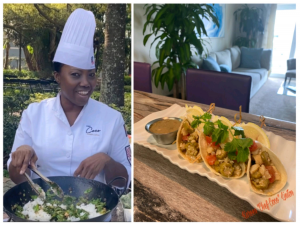 What’s cooking?
What’s cooking?
Youth Farm participants got a treat when Sharon “Chef Coco” Linton stopped by to teach the young folks how to cook the vegetables they grew. Chef Coco is the founder and president of A Dash of Coco, LLC based in downtown Tampa.
Sautéed Okra with Salted Cod or Pollock Tacos
1 pound okra, stems removed and sliced
1 pound Salted Cod or Pollock fish (Shrimp can also be used)
1 tablespoon olive oil
2 tablespoon butter
1 large tomato diced
½ teaspoon Smoked Paprika
1 teaspoon Italian seasoning
½ onion, chopped
1 garlic clove, chopped
Salt and pepper to taste
Directions
In a large sauté pan, heat olive oil over medium heat. Sauté onions and garlic for 2 minutes, or until onions begin to soften.
Add okra and cook 2 minutes.
Add seafood/meat of choice and cook for an additional 4 to 5 minutes. Season with salt and pepper.
This makes a great side dish or can be added as the filling for soft tacos.


